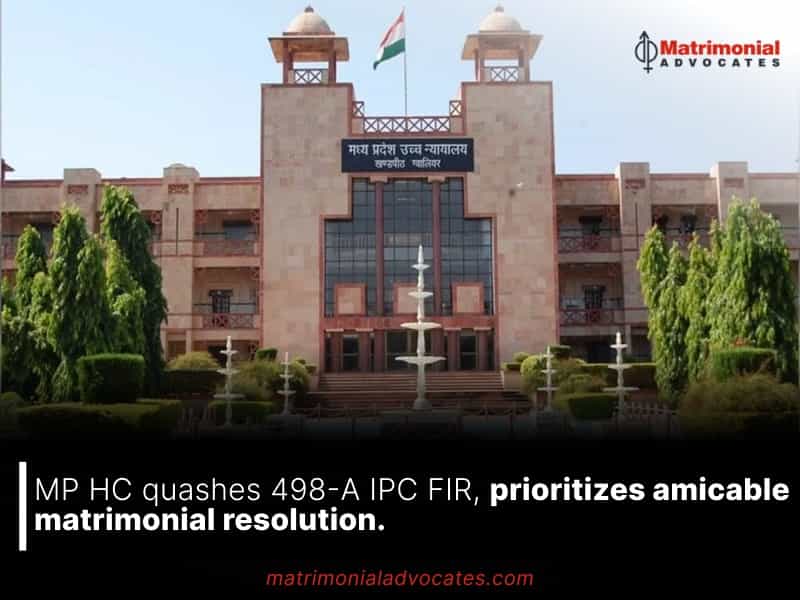
The Madhya Pradesh High Court has articulated the overarching objective of the law, extending beyond punitive measures to encompass the preservation of societal peace, tranquility, and concord. The Court has underscored the paramount importance of conciliation in matrimonial disputes, emphasizing its benefits not only to the parties involved but also to the broader societal framework.
In the specific case under consideration, the petitioners have sought the quashing of an FIR (First Information Report) registered against them. The complainant, the wife, had lodged the FIR, alleging transgressions under Sections 498-A, 323, and 34 of the Indian Penal Code, in conjunction with Section 3/4 of the Dowry Prohibition Act.
A Bench of Justice Prem Narayan Singh held, “this Court is of the considered view that the aim and object of law is not only to punish the offenders, but, also to maintain peace, tranquility and harmony in the respective society. If compromise between husband and wife is effectuated by the attempts of their family members, it will not only be good for society but also beneficial for their remaining life.”
Advocate Neelesh Agrawal appeared as the legal representative for the Petitioners, with Advocate Rajesh Joshi serving as counsel for the Respondents. The complainant alleged harassment by the Petitioners and asserted financial demands linked to her expressed intent to relocate to Australia. This assertion was made in the context of a marital relationship that had become strained due to a series of financial transactions and unsuccessful attempts to secure a residential visa for Australia, ultimately culminating in her return to India.
Subsequently, both parties arrived at a mutual understanding and jointly filed a compromise application under the provisions of Section 320 of the Criminal Procedure Code (CrPC). The legitimacy of this compromise was duly verified by the court registrar. Following this, the Petitioners sought the court’s intervention to quash the legal proceedings based on the terms of the compromise agreement.
In its deliberations, the Court made reference to pertinent Supreme Court precedents, notably including the cases of Gian Singh Vs. State of Punjab and B. S. Joshi v. State of Haryana. Consistent with these precedents, the Court emphasized the essential role of Section 482 of the CrPC in preventing the misuse of legal processes and ensuring the administration of justice. The Court underscored the imperative of exercising the discretion to terminate criminal proceedings with judicious scrutiny, considering the specific factual and circumstantial intricacies of each case.
The Court highlighted that the compromise between the parties, especially in matrimonial disputes, should be encouraged as it promotes peace and harmony. The Court added, “The object of compromise is to settle down in life and live peacefully. Need not to say that such type of compromise should be encouraged for maintaining matrimonial relations between the parties so that the parties may think over their defaults and settle their disputes amicably by mutual agreement instead of fighting in a Court of law where it takes years and years to conclude and in that process the parties loose their precious years in attending their cases in different Courts.”
Considering the settlement between the complainant and the accused, the Court decided to quash the proceedings, stating that allowing the case to continue could lead to further disputes, which would be against the interest of the parties involved. The Court said, “the complainant and members of the family of her husband have settled their disputes and have decided to live separately and, therefore, hyper-technical view regarding the compromise can be counter productive and against the interest of the woman and against the pious object for which the disputes between husband and wife have been settled, because in case the criminal proceedings are still permitted to continue then fresh series of dispute may start between the wife and the members of the family of her husband.”
The Court approved the petition, terminated the ongoing criminal proceedings in the Trial Court, and resolved the case.





